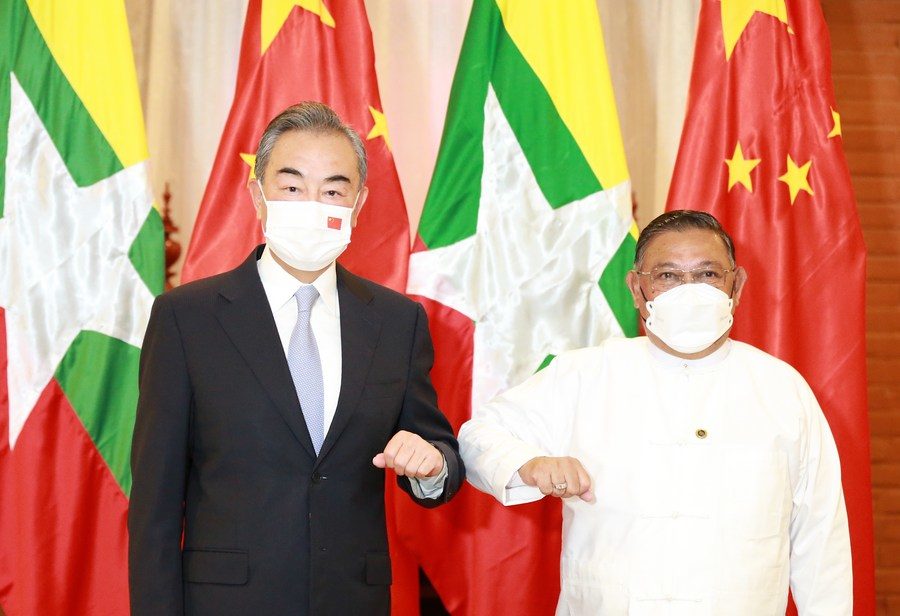Beijing makes its most high-level visit to Myanmar since the coup
Chinese Foreign Minister Wang Yi met with his Myanmar counterpart on the sidelines of a Lancang-Mekong Cooperation (LMC) group meeting on Sunday. It’s the most high-level visit from Beijing since the military takeover last year.

Home to thousands of Buddhist pagodas, temples, and monasteries, the ancient city of Bagan was once the capital of the first kingdom that unified the regions that would later form Myanmar. On Monday, the UNESCO World Heritage Site also hosted talks with foreign ministers from China and five Mekong Delta countries — the first multinational high-level meeting held in the country since the military junta overthrew the democratically elected government of Aung San Su Kyi in February 2021.
The meeting on economic cooperation brought together the members of the Lancang-Mekong Cooperation (LMC) group, a format for cooperation among the nations along Southeast Asia’s longest river, which includes China, Cambodia, Laos, Myanmar, Thailand, and Vietnam.
On the sidelines, Chinese Foreign Minister Wáng Yì 王毅 met on Sunday with with his Myanmar counterpart, Wunna Maung Lwin, in Beijing’s highest-profile visit to its Southeast Asian neighbor since the coup.
- Both sides pledged to step up work on the China-Myanmar Economic Corridor (infrastructure projects tied to Beijing’s Belt and Road Initiative, or BRI) and continue connecting their power grids.
- Wang Yi also called for Myanmar’s junta to hold talks with its opponents, urging “rational consultation” and “political and social stability.”
- Wang’s statement referenced the Five-Point Consensus — a peace plan laid out in April 2021 by the Association of Southeast Asian Nations (ASEAN), a grouping that both nations are a part of, that calls for an “immediate cessation of violence” and “constructive dialogue,” which the junta has largely ignored.
China remains one of Myanmar’s few international allies: Despite international criticism, Beijing has emphasized the nations’ pauk phaw friendship — a special phrase in Burmese that translates to “siblings” and that is used to describe their bilateral relations — and refused to condemn the 2021 coup that left hundreds dead and thousands displaced.
- Wang Yi said in April that China will back its neighbor Myanmar “no matter how the situation changes,” in a show of support to the military regime and in line with ASEAN’s policy of “non-interference.”
- In May, China and Russia blocked the UN Security Council from issuing a statement expressing concern about the violence and serious humanitarian situation in Myanmar.
- Last November, a Chinese envoy lobbied ASEAN nations to let Myanmar’s military chief, Senior General Min Aung Hlaing, attend a regional summit hosted by Chinese leader Xí Jìnpíng 习近平, but was met with stiff opposition from group members.
Beijing is also keeping an eye on its crucial investments in the nation, despite international criticism over any support lent to the junta, as Myanmar’s political unrest and local protests against Chinese projects have stirred up tensions between the two countries in recent years. “Beijing has accommodated itself to the junta while carefully hedging through both public and private pressure to come out on top in Myanmar,” writes Lucas Myers, the program associate at the Wilson Center’s Asia Program.
- A new international railway route from China’s southwestern Chongqing municipality to Mandalay, in southern Myanmar, started operating in May, in a bid to strengthen China’s ties with ASEAN and the Regional Comprehensive Economic Partnership (RCEP) members.
- About half of China’s heavy rare earth materials, such as dysprosium and terbium, come from Myanmar. Rare earths are widely used in products like batteries and electric motors, and are critical to China’s booming electric vehicle industry and in Beijing’s key aim to become carbon neutral by 2060.
- The Letpadaung copper mine, a joint venture between China’s state-owned Wanbao Co. and the military-owned Myanmar Economic Holding Limited (MEHL) company, has previously come under attack from local communities over issues on resettlement and fair compensation.
- However, Chinese actors have “shifted from their initial exclusive reliance on Myanmar’s national government and ruling elites to a growing relationship with actors that local communities trust and listen to as de facto partners and informal advisers…somewhat improv[ing] Chinese business relations with Myanmarese communities that had previously resisted their projects and investments,” reports U.S.-based think tank Carnegie Endowment for International Peace.
- “China’s gas pipeline will be burned,” chanted a group of protesters in Mandalay City in March 2021, amid a growing tide of anti-China sentiment in part from a recent surge in Chinese investment and infrastructure plans under the Belt and Road Initiative (BRI).
Meanwhile, Wang Yi’s visit to Myanmar is only his first stop on a tour of five Southeast Asian nations, as Beijing aims to shore up alliances in the region.






